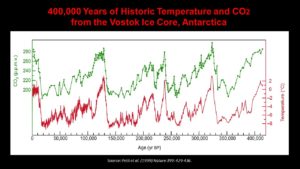by Institute for the Human Environment, August 2019
There is no debate as to whether or not atmospheric carbon dioxide, or CO2, is a so-called greenhouse gas. When present in the atmosphere, this one-carbon and two-oxygen molecule indeed has the capacity to absorb infrared radiation and warm the planet. There is also no debate as to whether or not the concentration of atmospheric CO2 is rising; over the past two centuries it has increased from a meager 0.028% of the atmosphere by volume to a still-meager 0.041% today. Furthermore, there is no argument that global temperatures are warmer today than they were 50, 100 or even 200 years ago. However, there is much debate on whether or not the modern increase in atmospheric CO2 has caused, or is presently causing, dangerous global warming, warming so severe that it is threatening life all across the planet.
…
But how accurate is this narrative?
In answering this question, one need only examine the historic temperature and CO2 records illustrated in Figure 1 more critically. Certainly, these two variables experience a fairly high degree of correlation over the time period shown. However, it doesn’t take a Ph.D. scientist to recognize and understand the fact that correlation among two variables does not prove causation. Every textbook on statistics teaches as much, and they also teach that a hypothesis of causation among two variables can be rejected if there is no statistically significant correlation between them, or if the correlation fails to be maintained in a consistent and expected manner across time.
By applying such principles to the case being considered here, it can confidently be argued that if carbon dioxide is indeed the all-important control knob of temperature that climate alarmists claim it to be, then changes in atmospheric CO2 should always precede changes in temperature. And, because CO2 is a greenhouse gas, to prove causation those changes must always be such that a rise in CO2 induces a corresponding rise in temperature, whereas a decline in CO2 must always induce a corresponding drop in temperature. Consistent observations to the contrary, if present in the historic record, would therefore serve to invalidate a causation claim, as well as demonstrate that atmospheric CO2 is nothing more than a bit player among the many factors that drive climate change.
…

